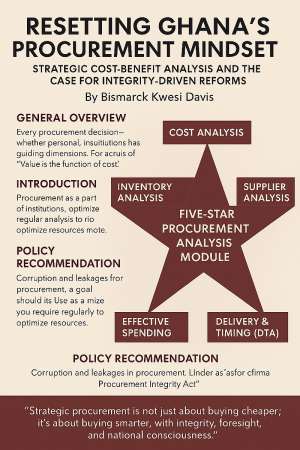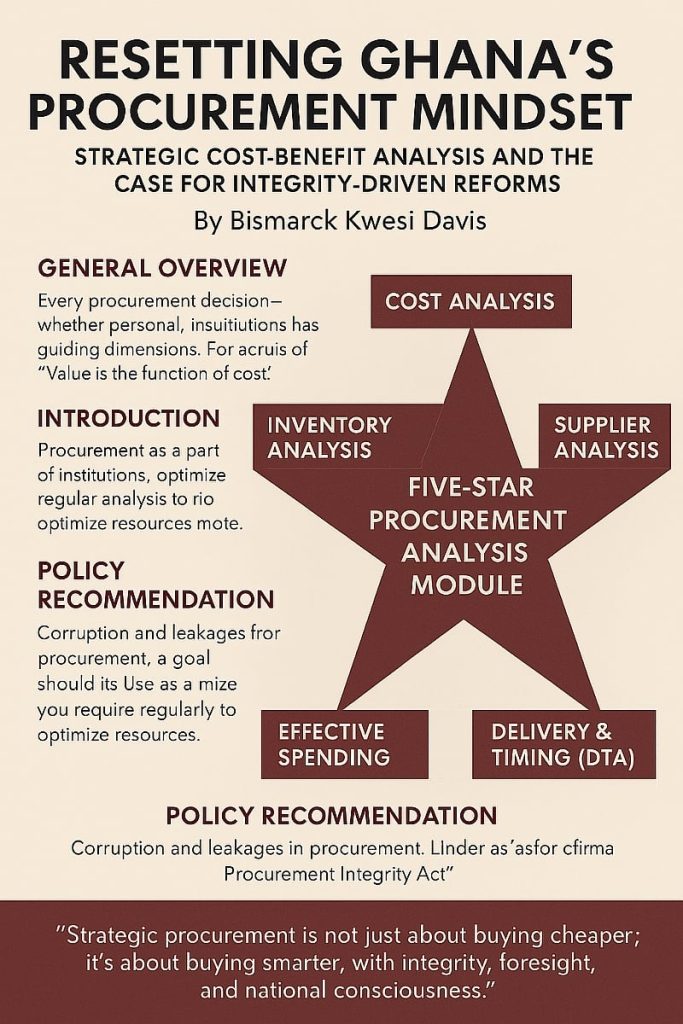 ‘Resetting Ghana’s Procurement Landscape: A Strategic Shift Towards Transparency, Value, and Inclusive Growth’ – This infographic illustrates the transition from opaque single-source contracting (2017–2024) to Ghana’s 2025 multi-sourcing procurement strategy, aligning with global standards and Sustainable Development Goals (SDGs)
‘Resetting Ghana’s Procurement Landscape: A Strategic Shift Towards Transparency, Value, and Inclusive Growth’ – This infographic illustrates the transition from opaque single-source contracting (2017–2024) to Ghana’s 2025 multi-sourcing procurement strategy, aligning with global standards and Sustainable Development Goals (SDGs)GHANA’S PROCUREMENT DILEMMA: CLEARING THE PATH TO NATIONAL PROSPERITY
1.0 The Hidden Price of Every Decision
Every procurement decision—from a corporate tower to a rural district office—is a bet on a nation’s future. It’s not just about price tags; it’s about accountability, progress, and the trust of a people. In Ghana, procurement is the fulcrum of development, capable of lifting millions or plunging them into the abyss of waste.
When value is ignored and deadlines dissolve into excuses, the Ghanaian taxpayer bears the burden. As I wrote in 2017:
“Value is the function of cost” (Davis, 2017).
“Procurement and supply chain leadership is no longer about just buying cheaper—it’s about building systems that think, adapt, and deliver value sustainably across borders.”
|Bismarck Kwesi Davis|
This isn’t just a maxim—it’s the spark for Ghana’s procurement revolution.
1.1 Why Procurement Is Ghana’s Make-or-Break Moment
Procurement isn’t a dusty department buried in bureaucracy. It’s the lifeblood of fiscal discipline, the engine of national progress, and, too often, the fault line of systemic corruption. From classrooms to clinics, every cedi spent shapes Ghana’s destiny.
Between 2017 and 2024, Ghana’s procurement system stumbled under the weight of opaque, single-source contracts. Despite the Public Procurement Act, 2003 (Act 663) and its 2016 amendment (Act 914), political meddling and institutional apathy allowed billions to vanish into questionable deals. The result? A betrayal of public trust and a ledger stained with inefficiency.
But 2025 dawns with hope. A new administration, armed with a Ministry of Finance-led Procurement Oversight Taskforce, pledges transparency, multi-sourcing, and economic empowerment for Ghanaian businesses. This isn’t just policy—it’s a lifeline to restore procurement as a tool for progress, not plunder.
1.2 The Five-Star Procurement Blueprint: A Roadmap to Reform
To reclaim procurement’s potential, Ghana needs a bold, data-driven strategy. Enter the Five-Star Procurement Blueprint—a framework to maximize value, curb waste, and ignite development.
1.2.1 Cost Analysis: Beyond the Sticker Price
A contract’s cost isn’t its invoice—it’s the Total Cost of Ownership (TCO), encompassing delivery, storage, maintenance, and economic risks. Late shipments cripple productivity; excess stock suffocates budgets. By adopting TCO, Ghana can prioritize long-term value over fleeting bargains.
1.2.2 Inventory Analysis: Money in Motion
Inventory is cash masquerading as goods. Overstocking breeds waste; understocking stalls progress. Embracing Just-In-Time (JIT) principles, paired with predictive analytics, can slash storage costs and align supplies with real-time needs. Regular audits will stamp out ghost spending and ensure every cedi counts.
1.2.3 Supplier Analysis: Competition Fuels Progress
Leaning on a single supplier invites complacency and corruption. A dynamic system evaluates vendors on quality, reliability, and ethics, fostering multi-sourcing to spark innovation and uplift local businesses. A national supplier database, refreshed quarterly, will hold vendors accountable and drive excellence.
1.2.4 Spending Controls: Slamming the Door on Waste
Maverick spending is a silent thief. Quarterly procurement reviews, powered by automated anomaly detection, can expose inflated prices, duplicate orders, and rogue purchases. These controls will restore discipline, ensuring budgets serve the people, not the powerful.
1.2.5 Delivery Timing & Alignment (DTA): Time Is Value
Late deliveries—whether textbooks or vaccines—rob Ghanaians of quality services. Contracts must enforce Service Level Agreements (SLAs), tying payments to strict timelines. When suppliers know delays cost them, punctuality becomes non-negotiable.
1.3 Legislative Reform: Closing the Loopholes
Ghana’s procurement laws—Public Procurement Act, 2003 (Act 663) and Amendment Act, 2016 (Act 914)—created the Public Procurement Authority (PPA), but cracks remain. Emergency procurements, lax sanctions, and unchecked single-sourcing invite abuse. It’s time for a game-changer:
The Ghana Procurement Integrity Act (GPIA)
This proposed law will:
Criminalize unapproved single-sourcing above GHS 500,000, with jail time for offenders.
Establish an independent Procurement Tribunal to swiftly resolve disputes.
Mandate real-time, public disclosure of all contract awards.
Align procurement with the UN Sustainable Development Goals (SDGs), ensuring every cedi advances global and local priorities.
1.4 Rwanda’s Lesson: Digital Procurement, Real Results
Rwanda’s Umucyo e-Procurement platform, launched in 2015, proves what’s possible. By digitizing bids, evaluations, and audits, Rwanda slashed procurement corruption by 54% and saved over $35 million in three years. Ghana can follow suit. A digital procurement system will curb human interference, boost transparency, and unlock billions for development.
2.0 The Way Forward: From Crisis to Catalyst
Procurement can be Ghana’s greatest ally or its Achilles’ heel. From 2017 to 2024, it too often broke the nation’s trust. But 2025 offers a chance to rewrite the story. The administration’s push for transparency, multi-sourcing, and digital reform, backed by bold legislation, can transform procurement into a beacon of progress.
Ghana stands at a crossroads. Will we cling to Procurement for Power or embrace Procurement for Purpose? The choice is ours—and the time is now.
Quantifying the Reform’s Impact
To measure the Five-Star Procurement Blueprint’s potential, we use a savings model:
S = (C_b – C_o) × P × E
Where:
S = Annual savings (GHS).
C_b = Baseline procurement cost (current, inefficient system).
C_o = Optimized cost post-reform.
P = Proportion of procurement spending impacted (e.g., 0.8 for 80% of contracts).
E = Efficiency factor (e.g., 0.9 for 90% compliance).
TRIAL
Ghana’s annual procurement spending is ~GHS 20 billion, with inefficiencies inflating costs by 25% (C_b = 1.25 × optimal cost). The Blueprint reduces costs to the optimal level (C_o = 1.0 × optimal cost), impacting 80% of contracts with 90% compliance.
Optimal cost = GHS 20 billion ÷ 1.25 = GHS 16 billion.
C_b – C_o = GHS 20 billion – GHS 16 billion = GHS 4 billion.
S = GHS 4 billion × 0.8 × 0.9 = GHS 2.88 billion in annual savings.
This translates to nearly GHS 3 billion annually—enough to build schools, equip hospitals, or pave roads, proving reform isn’t just ethical; it’s economic.
REFERENCES
Davis, B. K. (2017). Value is the function of cost. Accra: Ghana Publishing.
Public Procurement Act, 2003 (Act 663), Ghana.
Public Procurement (Amendment) Act, 2016 (Act 914), Ghana.
Rwanda Public Procurement Authority. (2018). Impact of the Umucyo e-Procurement System. Kigali: RPPA.
World Bank. (2020). Reforming public procurement: Global case studies and recommendations. Washington, DC: World Bank Publications.
Bismarck Kwesi Davis
COO – Diamond Institute GH || LIT- DIAMOND VENTURES || Zealots Ghana International
Facebook: BismarckDavis|| Twitter: BismarckDavis|| Instagram: BismarckDavis
M/W: 0244677888 ||
#bismarckinspires


